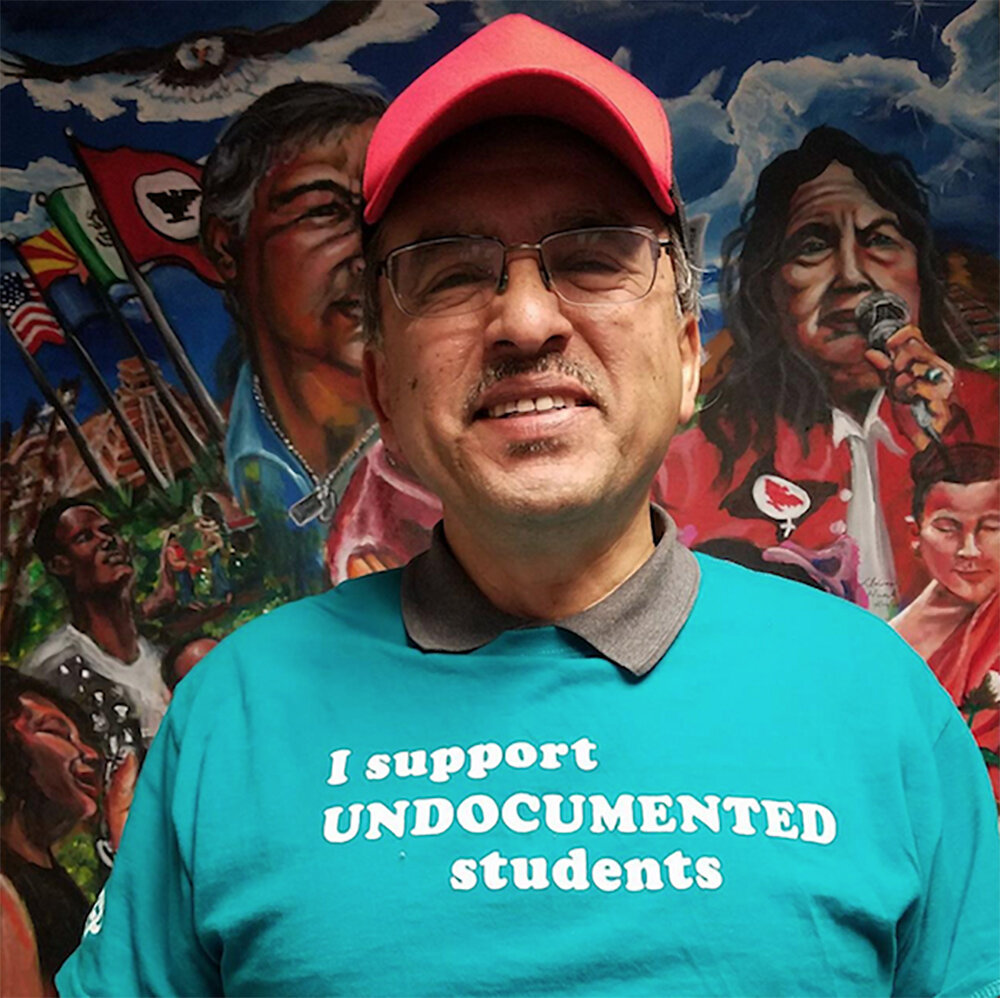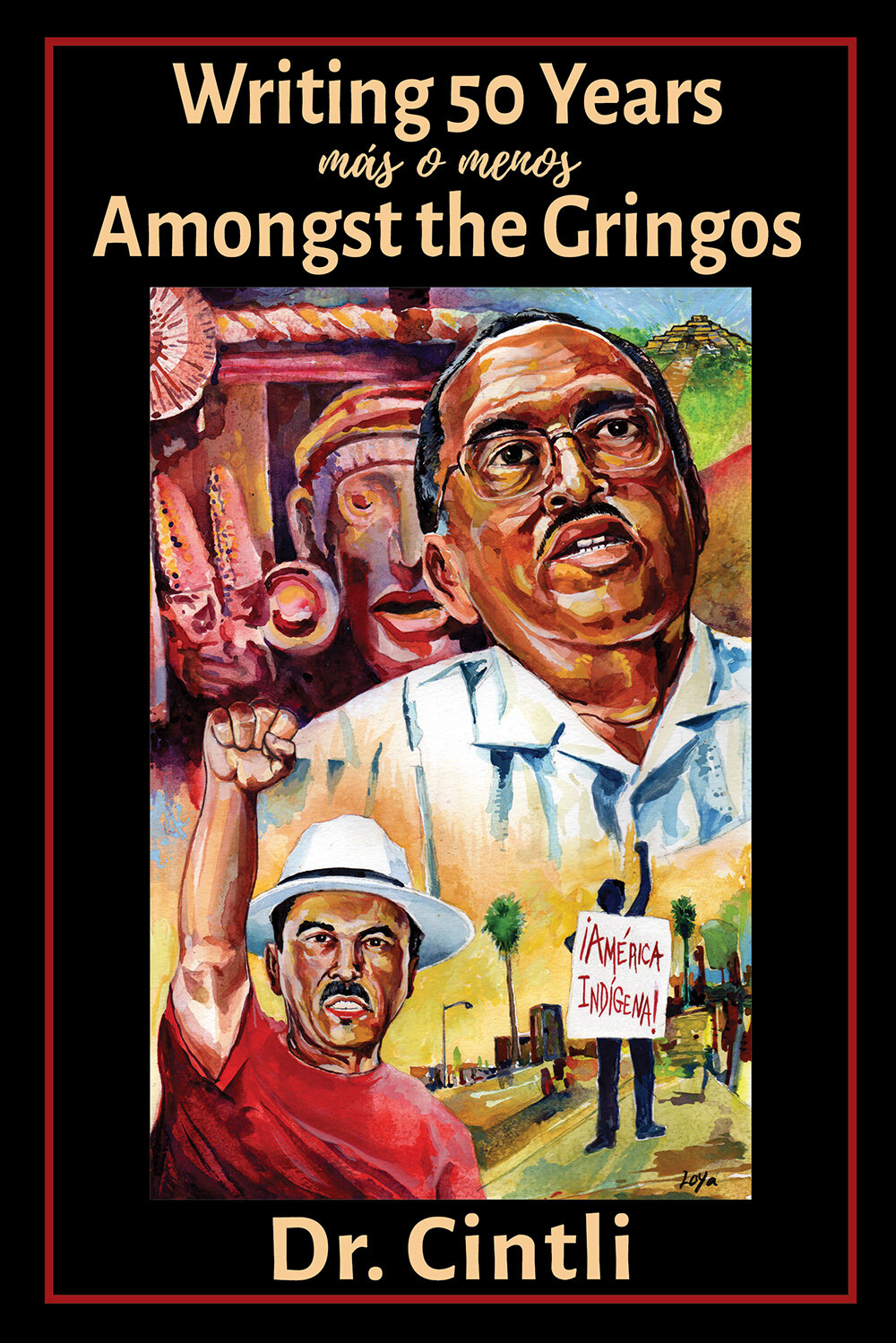Aztlan Libre Press Release Cintli's Latest Collection
September 16, 2021 - San Antonio
By Ricardo Delgado, Staff Writer | San Antonio Sentinel
WHAT YOU NEED TO KNOW:
- A subject for Cintli in his writings is police brutality, having been beaten brutally by members of the Los Angeles County Sheriff’s Department in 1979.
- Dr. Cintli’s “Writing 50 Years (más o menos) Amongst the Gringos” can be pre-ordered for the discounted price of $25 and bought in release for $35 on Aztlan Libre Press’ website.
Reflecting on almost 50 years of writings, Roberto Rodriguez gathers some of his best works and shares wisdom from trauma and elders in “Writing 50 Years (más o menos) Amongst the Gringos”.
Written under the pen name Dr. Cintli, his preferred identity in the context of his works, Cintli’s massive collection of 91 writings hits shelves in late September and spans the last five decades of his life, from 1973 to 2021.
The emeritus associate professor in the Mexican American Studies Department at the University of Arizona in Tucson moved to San Antonio in the 1980s, but is currently in Mexico for an indeterminate amount of time, living near the pyramids of Teotihuacan, soaking in the inspiration of a place he said the American education system ignores far to often.
Cintli estimates his writings to be in the thousands over the years, columns, fiction, poetry and huehuetlahtolli, or ancient guidances.”Writing 50 Years...” narrows down his body of work to less than 100 pieces, distilling his identity and experiences formed over just about 50 years of victories and traumas.
A press release for “Writing 50 Years…” from the Aztlan Libre Press, the book’s publisher, highlighted how Cintli’s writings reflect both personal and cultural growth in the world as he documented it.
“Not only does this collection document his personal life’s work and evolution as a writer, journalist, columnist, academic and public intellectual, it also chronicles those movements and issues that have been, and are, important to la Raza Mexicana and the Xicanx/Latinx people in the U.S.” the press release stated.
Many of the pieces discuss civil rights and indigeneity, topics following Cintli since his first writings.
“When you see the collection, you see a consistent theme, and that's pretty much human rights’” Cintli said. I think in those days, they called it civil rights, you know, but I think both civil and human rights. And so that's what I've done pretty much my whole life. I don't know that I consciously chose it[...]”
Cintli began writing during the Chicano Movement, his earliest writing in “Writing 50 Years...” dating back to 1973. He cited the death of Los Angeles Times reporter Rubén Salazar on Aug. 28, 1970, killed by a tear-gas projectile fired by a Los Angeles County sheriff’s deputy, as the impetus to speak out and write down his thoughts.
“It made an incredible impact on me,” Cintli said. “In my mind, I didn't want to keep quiet. I didn't want to keep my opinions to myself, because they had killed somebody, and I thought that we need to speak up about it, as opposed to act[ing] like nothing happened, or ‘both sides are equal.’”


Many of the columns and writings in “Writing 50 Years...” are in relatively simple verbiage — a conscious decision by Cintli, he says, influenced by the people who gave him his stories.
“I got my PhD, my dissertation is based on my father's stories, his memory,” Cintli said. “He had Alzheimer's at the end. But I still tap into that memory. And I remember when I went up for my defense of my dissertation, they asked me why I write so simple. And I said, 'Well, you know, most of my knowledge comes from elders, including my parents. So, I want the people that gave me the knowledge to be able to understand what they gave me.'”
He adds the audience’s comprehension is just as important. Given that his doctorate degree is in Mass Communications, he understands the importance of keeping a persuasive column direct and jargon-free when discussing heavy topics.
“I've always been motivated by being able to reach as many people as possible,” Cintli said. “People may not agree, but at least they'll understand what I'm saying.”
A salient subject for Cintli in his writings is police brutality, having been beaten brutally by members of the Los Angeles County Sheriff’s Department after photographing them assaulting an innocent man in East L.A. in 1979. Cintli spent three days in the hospital following the beating and seven years and a half years in the courts pleading his case, which he eventually won on Nov. 7, 1986.
“Part of the trauma involves getting beyond it,” Cintli explained. “And for me, I don't think I've ever been able to get beyond it because it took me seven and a half years to win my trials. And then I didn't stop writing about the topic. Unfortunately, that's a reality of the world we live in, especially in the United States.”
His extensive writings on the subject of police brutality weathered him on the topic, but its relentless recurrence in everyday life makes it hard for Cintli or the victims of the brutality to escape it.
“I think I've written about it in every way, in every manner possible,” Cintli said. “From memory to trauma, to psychology, pretty much everything and it just doesn't go away.”
Cintli now celebrates his victory on Nov. 7 over his trauma, as he said he is one of the few who have a concrete victory to celebrate. When asked what victories minorities in the United States could celebrate, he recalled conversations with Indigenous people who considered merely being alive a victory. His definition centered more on escaping the fetters of trauma, whatever the source.
“That in a way is the opposite of trauma, to be free of those impositions, to be free of other people's expectations”, said Cintli. “And it's beyond expectations, because that's the whole point of colonialism, you know, that everything is imposed from how you think, to when you work, and on and on.”
Asked what he envisioned the next 50 years (más o menos) looking like and the conversations taking place therein, he simply hopes minorities will be allowed to participate in the discussion over what it means to be human and how humanity will deal with its mounting existential challenges, like climate change, as they have been systematically excluded for centuries prior.
“I don't think the objective of life should be to fight for humanity,” Cintli said. “In other words, we should be viewed and treated as fully human at all times. And so hopefully, we're not having to do that 50 years from now. We should be in a society where we all are treated equally.”
Dr. Cintli’s “Writing 50 Years (más o menos) Amongst the Gringos” can be pre-ordered for the discounted price of $25 and bought in release for $35 on Aztlan Libre Press’ website, where many other works by and about Indigenous peoples can be purchased.
Ricardo Delgado transferred to Texas State University at San Marcos to study journalism and minor in political science. He graduated during the spring of 2021. Email him at reporter@sasentinel.com

